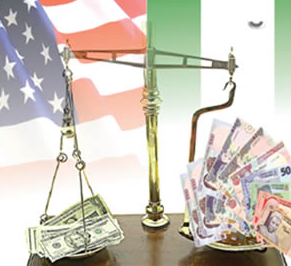The plans by the United States (US) to raise interest rate to about .7 percent this week would further weaken capital inflows into the Nigerian markets, and the currency against the dollar which will increase government’s foreign debt servicing cost, analysts said.
In 2015, the Federal Open Market Committee (FOMC) raised the Fed funds target to a range from 0.25 percent to 0.0.50 percent.
David Oppedahl, senior business economist, at Federal Reserve Bank, Chicago, said interest rate is expected to increase this week. Receiving a group of Nigerian journalists who visited the office Oppedahl said the interest rate in 2017 will rise to 1% while it would be getting up to 3% in 2019.
Oppedahl said the outlook is for U.S economy to expand at a pace around trend through 2019, adding that shrinking slack in the economy will help inflation rate gradually rise towards 2%.
In 2015, the Federal Open Market Committee (FOMC) raised the Fed funds target to a range from 0.25 percent to 0.0.50 percent.
David Oppedahl, senior business economist, at Federal Reserve Bank, Chicago, said interest rate is expected to increase this week. Receiving a group of Nigerian journalists who visited the office Oppedahl said the interest rate in 2017 will rise to 1% while it would be getting up to 3% in 2019.
Oppedahl said the outlook is for U.S economy to expand at a pace around trend through 2019, adding that shrinking slack in the economy will help inflation rate gradually rise towards 2%.
According to Eronmosele Aziba, investment research, Afrinvest Securities limited, an expected impact from a hike in rates is a reversal in capital inflows into emerging markets and Nigeria is not excluded.
More specifically, some of the potential impacts on Nigeria include, reduction in the already weakened capital inflows into the Nigerian markets.
Further weakening of the domestic currency against the dollar which will increase government’s foreign debt servicing cost and further strain the already thinned government foreign revenue.
In relation to the above, he said the sovereign rating of the country could be pressured, in the event of a default and this will impede the government’s ability to source for foreign denominated loans, and weaker performance of the Equities market, as foreign participation will reduce.
“Despite these, we believe that investors have somewhat already priced in expectation of a rates hike in their investment decisions, hence the impact of a rates hike may be lessened”, Eronmosele said in an emailed response to MetroBusinessnews.
Robertson Charles, Renaissance Capital’s Global Chief Economist, does not see any impact of the expected U.S interest rate hike on nigeria, saying in an emailed response that “foreign investors are not involved in Nigeria owing to exchange rate problems – so the country is isolated from global markets at present”.
David Denis, senior, Chair, and professor of business administration, University of Pittsburgh, USA, said It is always difficult to predict the economic impact of Fed actions. In general, he added that the Fed keeps rates low when they believe that low rates are necessary to stimulate the economy through corporate investment. They raise rates when they start to get worried that the economy might get overheated and, therefore, inflate prices too much. If that happened, inflation would harm economic growth so the Fed might raise rates in order to avoid inflation. In theory, therefore, the Fed changes rates to try and keep the economy on an even keel. It is difficult to do, however, so sometimes you will see some short-run effects.
More specifically, some of the potential impacts on Nigeria include, reduction in the already weakened capital inflows into the Nigerian markets.
Further weakening of the domestic currency against the dollar which will increase government’s foreign debt servicing cost and further strain the already thinned government foreign revenue.
In relation to the above, he said the sovereign rating of the country could be pressured, in the event of a default and this will impede the government’s ability to source for foreign denominated loans, and weaker performance of the Equities market, as foreign participation will reduce.
“Despite these, we believe that investors have somewhat already priced in expectation of a rates hike in their investment decisions, hence the impact of a rates hike may be lessened”, Eronmosele said in an emailed response to MetroBusinessnews.
Robertson Charles, Renaissance Capital’s Global Chief Economist, does not see any impact of the expected U.S interest rate hike on nigeria, saying in an emailed response that “foreign investors are not involved in Nigeria owing to exchange rate problems – so the country is isolated from global markets at present”.
David Denis, senior, Chair, and professor of business administration, University of Pittsburgh, USA, said It is always difficult to predict the economic impact of Fed actions. In general, he added that the Fed keeps rates low when they believe that low rates are necessary to stimulate the economy through corporate investment. They raise rates when they start to get worried that the economy might get overheated and, therefore, inflate prices too much. If that happened, inflation would harm economic growth so the Fed might raise rates in order to avoid inflation. In theory, therefore, the Fed changes rates to try and keep the economy on an even keel. It is difficult to do, however, so sometimes you will see some short-run effects.
